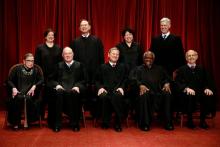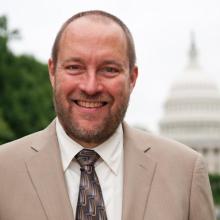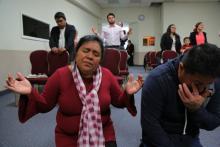Opinion

It may take years to fully grasp the import of the Supreme Court’s decision in Trinity Lutheran Church v. Comer, where the court ruled 7-2 that the state of Missouri had expressly and unjustifiably discriminated against a church by disqualifying it from receiving a public benefit (scrap tire to enhance playground safety) solely because of the church’s religious character.
But here are six initial observations about the ruling:

We come as women and men of faith. Though separated by physical distances, cultural differences, and faith traditions, many of us united in prayer and fasting in May, directed toward God’s intervention in the politics of the United States, especially as it relates to the poor and vulnerable. We pray for wisdom for our governmental leaders, but we are committed to continued advocacy for those most in need of society’s safety nets.

“This boils down to a choice, a fundamental choice and the choice is this: Do you take a trillion dollars and help the poor and vulnerable and the working class in this country and their health care, subsidized by the federal government, or do you take the trillions of dollars and return it to the wealthy in the country? That’s really the fundamental choice here.” I heard Matthew Dowd say that on This Week with George Stephanopoulos this past Sunday. I met Dowd recently. He is a former George W. Bush advisor, and told me he is a Catholic from my home town of Detroit. He is right. These are indeed about basic choices that are not just political but moral ones. It’s time to make some choices.

Evangelicals believe that people and nations are sufficiently blessed by God’s common grace that we can seek the good of others, as well as our own welfare. As a result, we are prepared to work together across partisan divides and to respect those with whom we may differ on policy choices. Our churches bring together Democrats, Independents, Republicans, and people who have no political affiliation at all. Our call to protect programs that serve our most vulnerable neighbors transcends any political party.

Coming together from all streams of American Christianity to speak in opposition to cuts on the safety-net programs is no minor achievement. We have a widespread consensus on the priority of providing essential life saving support to poor people in our country. We also agree in that the ultimate goal is to create a just society in which everyone live an abundant life that includes meaningful work with fair salaries, affordable health care and education, and time for leisure and recreation.

When we say the most vulnerable or the “least of these” we are not talking about numbers on a page. We are talking about the elderly — grandmothers and grandfathers, deacons, trustees, and ushers, children’s ministry workers, community leaders, and those who have worked for decades to provide for themselves and their families. We are talking about children and youth who were born with purpose and possibilities, who have their whole lives ahead of them, future pastors, and lay leaders, lawyers, teachers, journalists, and members of Congress — those who will determine the future our nation. We’re talking about those who have disabilities and those who work hard every day – sometimes two and three jobs to make ends meet and provide for their families but get paid low wages that do not cover the high cost of living in most cities and towns in our nation.

One of the defining marks over time between denominations in the Christian world is how we interpret the Bible — the words and teachings of Jesus — and how we decipher his stories and actions. Today we’re examining Jesus’ life with a megaphone, and it seems like everyone has joined the conversation, not over a cup of a hot coffee or a meal, but at our keyboards and in our pulpits and Bible studies. We’ve gone from a faithful religion to a political and social religion, in which the teachings of Jesus are used by us to prop up whatever we are claiming in our latest argument.

The new film Baby Driver is a movie that expresses joy through art, specifically music. The action film from director Edgar Wright connects the joy of listening to a favorite song to the way those musical rhythms color our everyday lives. At its best, the film is a celebration of joy in creativity that bleeds over into a joy in creation itself. It struggles, however, to turn that aesthetic delight into something of substance.

Thirteen male senators wrote a 142-page healthcare bill behind closed doors that puts the health of women in the U.S. in danger. While the authors of the “Better Care Reconciliation Act of 2017” may have forgotten about women — only including the words “women” and “woman” a few times in the whole document — Jesus never forgot about women’s health.
Let us not forget that healing was central to Jesus’ ministry, and the healing of afflicted women was just as important to him as the healing of men. Jesus healed a woman on the Sabbath in a room full of protesting men (Luke 13:10-17). Jesus healed a hemorrhaging woman considered ritually unclean who had been denied coverage — in a sense — for 12 years (Mark 5:25-34, Matthew 9:20-22, Luke 8:43-48).

Even more difficult than the question of whether or not we are collectively willing to break the law is the question of whether we are ready to embody what a “culture of sanctuary” holistically invites us to be.

During the election campaign, many Christian leaders together asked the presidential candidates to tell us what they would do to provide help and opportunity to hungry and poor people. Donald Trump wrote to us on Sept. 28. You can find his letter on circleofprotection.us. Candidate Trump expressed concern about poverty in America and around the world. He said nothing about deep cuts in the programs that help people in poverty.

There are so many loud and shrill voices in various religions today, ones filled with fear and self-righteousness and arrogance and judgement and hatred — the very things that faith tells us to avoid. Those voices try to divide us and diminish us. They twist religion into the opposite of what it’s meant to be, hoping to advance their personal agendas.

This summer, I opened the pages of Nina Riggs’ memoir on living and dying, The Bright Hour, the same day that I walked into a cancer treatment center for the first time in my life. I’d waited for the publication of this book after reading about her embrace of daily life in Greensboro, N.C., as she faced a terminal diagnosis of metastatic breast cancer. During the short period chronicled in the book, the author watches her mother and her best friend Ginny die of cancer: To say that Riggs — and here I just have to call her Nina — has a familiarity with grief is a bit of an understatement.

At The Summit, Sojourners' annual gathering of leaders from across the country, attendees spent Friday morning calling their senators, demanding they vote against the bill — which Majority Leader Mitch McConnell wants to push through next week, before the July 4 recess. Those gathered are calling on their constituents to do the same. Here's how.

Many of our national monuments are culturally significant — the Pullman in Chicago, Cesar Chavez in California, and Freedom Riders in Alabama. The recent order by the Trump administration to review these treasured lands puts our national, cultural, and ecological heritage at risk.

By the time I learned to read, Juana’s eldest daughter Lesvi was suffering from a life-threatening illness in Guatemala. She returned to care for her daughter, risking her own safety to make the dangerous trek. When she returned to the U.S., she learned that not only would her asylum status be denied, but she would be ordered to leave the country. But she couldn’t. Her child needed medical care.

We will be making this joint statement under the banner of the Circle of Protection, a broad coalition of leaders from all the families of U.S. Christianity that was founded in 2011 in service of the biblical mandate to protect poor and vulnerable people. While individual members of the Circle have raised their voices in opposition to harmful budget cuts and legislation that the Trump administration and Congress have proposed — notably many of us came together for a powerful prayerful event outside the Capitol Building in late March for just such a purpose —this will be the first time that the entire Circle is making such a joint statement.

The idea of having power is so enticing that of all the theoretical options to destroy Christ, Satan chose the promise of ruling the world as his best and final temptation of Jesus in the desert. It was ultimately a futile attempt, but given the biblical narratives displaying humanity’s addictive desire for earthly kingdoms, their bloodlust for military victories, quests for political dominance, and insatiable greed for wealth, it’s unsurprising that it’s through these manifestations that Christianity is most vulnerable to ruin.

Most Christians I know who have a lot of negative feelings about feminism lack proximity to actual feminists. When I say proximity, I don’t mean that you follow a well-known feminist writer or celebrity on Twitter, or sat in on a think tank, or have that one family member who you only speak to over Thanksgiving dinner. What I mean is most of our circles tend to be homogeneous. We hang closely with people who look, think, and act like we do. We also tend to build close relationships with people who agree with us on certain issues. We further validate our efforts to remain in these homogeneous circles by oversimplifying scripture like, “iron sharpens iron”, or by stating our need for “safe spaces” and like-minded community. However, Jesus did the exact opposite. From life to the desert to the cross, Jesus lived his life and sacrificed it for people who did not look, think, or act like him.

In a nation founded on violence, how are we to respond when young indigenous people are beaten to death by police or young black men are shot in the front seat of their cars? What do we do when young Muslim women are assaulted on the way to say prayers with their community? In an attempt to protect ourselves from violence, we actually bring violence to our schools and neighborhoods, because we live a gospel of violence perpetuated over time by our attitudes of hate and racism toward one another.